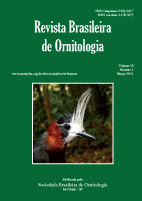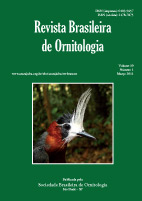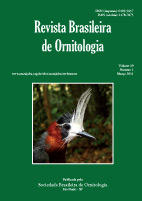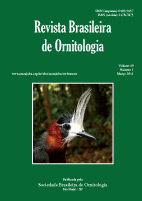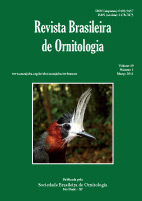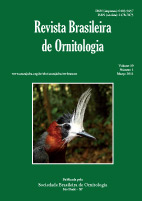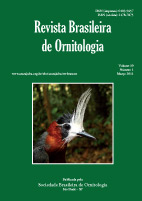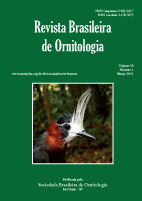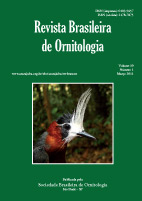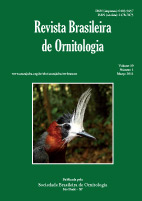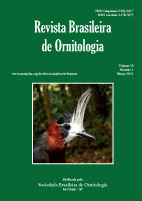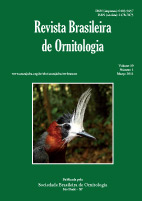Volume 19, Number 1 - March 2011
Editor: Luís Fábio Silveira
São Paulo, SP
Pages: 92
Editor: Luís Fábio Silveira
São Paulo, SP
Pages: 92
Full Issue
| View or download the full issue |
Table of Contents
Article
| Diversity, biomass, and trophic structure of a central amazonian rainforest bird community | ||
| Erik I. Johnson, Philip C. Stouffer, Claudeir F. Vargas | 17 |
| An experimental test of the benefits of hatching asynchrony in the Rufous Hornero (Furnarius rufus) | ||
| Maximiliano Niedfeld Rodriguez, James J Roper | 6 |
| A comparative study of bird communities in two forest fragments of the caatinga in Pernambuco State, Brazil. | ||
| Glauco Alves Pereira, Severino Mendes Azevedo Júnior | 11 |
| Cleaner birds: a worldwide overview | ||
| Ivan Sazima | 17 |
| Effects of environmental enrichment in the diminution of abnormal behaviours exhibited by captive blue-fronted Amazon parrots (Amazona aestiva, Psittacidae). | ||
| Aline Amorim Andrade, Cristiano Schetini Azevedo | 8 |
| Mutual interactions between frugivorous birds and plants in an urban fragment of Atlantic Forest, Salvador, BA. | ||
| Pedro Cortes Andrade, João Vitor Lino Mota, Anderson Abbehusen Freire Carvalho | 12 |
| Occurrence and interaction of wild birds at poultry houses in southern Brazil | ||
| Angelo Luis scherer, Janete de Fátima Martins Scherer, Maria Virginia Petry, Martin Sander | 7 |
Note
| A new name for Chordeiles nacunda minor (Cory, 1915). | ||
| Carlos Eduardo Agne, José Fernando Pacheco | 2 |
| Black Vulture (Coragyps atratus): bath and drink | ||
| Ivan Sazima | 5 |
| Historical record of nesting of the Urubitinga coronata in Santa Teresa, Espírito Santo, Brazil. | ||
| Aureo Banhos, Tânia Margarete Sanaiotti | 4 |
| First record of the Harpy Eagle Harpia harpyja in the Pantanal, with data about breeding activity. | ||
| Flávio Kulaif Ubaid, Luciana Pinheiro Ferreira, Samuel Borges Oliveira Júnior, Paulo de Tarso Paulo de Tarso Antas | 6 |
** The work of the Editor in Chief, Managing Office, Associate Editors, and the Editorial Council of Revista Brasileira de Ornitologia is strictly voluntary, and does not involve the use of any resources and infrastructure other than the personal ones**




